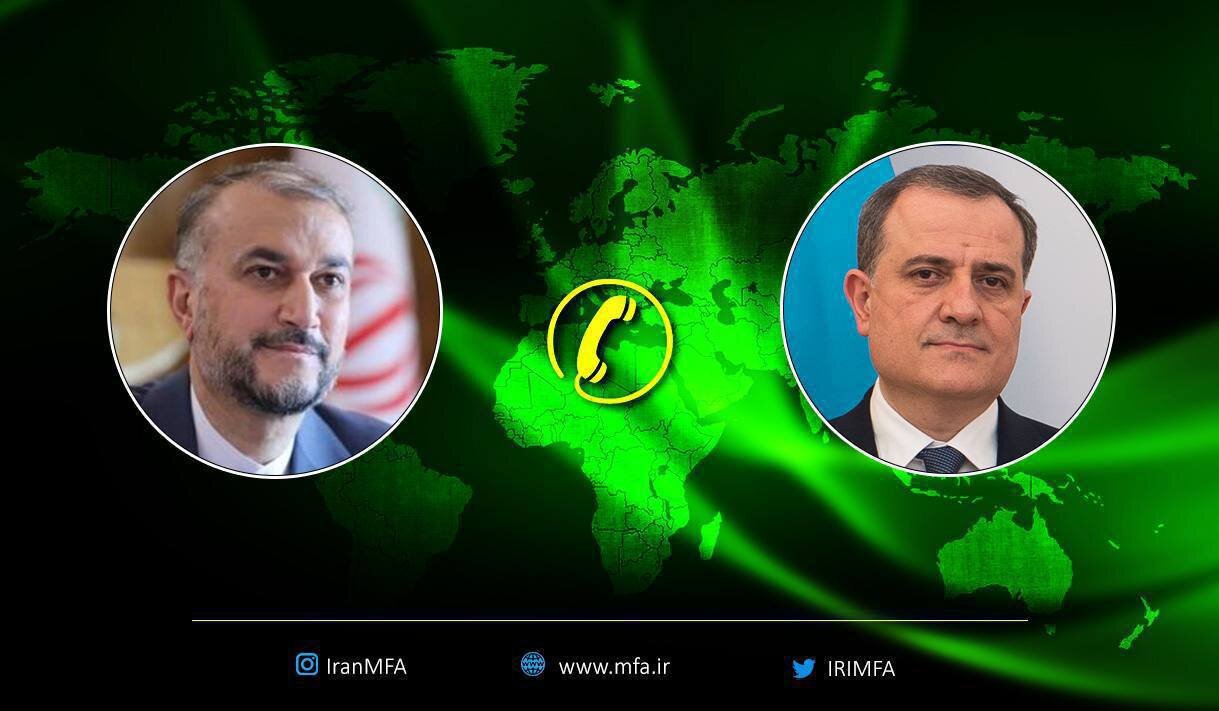Tehran says Iran, Azerbaijan able to resolve issues

TEHRAN- Iran and the Republic of Azerbaijan can resolve the current issues on their own without the assistance of other countries, Iran’s Foreign Minister Hossein Amir Abdollahian said in a phone conversation on Monday with his Azeri counterpart Jeyhun Bayramov.
“Relations between the Islamic Republic of Iran and the Republic of Azerbaijan are such that they can resolve the existing problems in their ties in a bilateral manner and put them on the right track,” Amir Abdollahian declared.
The chief diplomat also discussed the most significant national and international events with Bayramov, highlighting the need of ongoing and close communication between the two neighboring nations.
For his part, the Azeri foreign minister praised Amir Abdollahian’s “constructive efforts” to ease the tense situations between the two nations.
Bayramov characterized his conversation with the Iranian foreign minister as “constructive” and expressed optimism that ties will deepen when a number of unresolved problems were soon settled.
The North-South Transport Corridor and future collaboration within regional and global organizations such as the Economic Cooperation Organization and the Non-Aligned Movement were additional topics of discussion between the two foreign ministers.
The foreign ministers had stressed in a previous phone call in the current month that it was crucial for the two neighbors to work out their differences in order to preserve their mutual connections.
Back then, both top diplomats emphasized the need of maintaining talks between Tehran and Baku and that the two nations needed to exchange technical teams to assist resolve their disputes.
When Azerbaijan’s embassy in Tehran was attacked in January, ties between Tehran and Baku deteriorated.
The attack was classified as a “terrorist” incident by Azerbaijan, despite the fact that an investigation revealed the assailant was driven by “personal and family-related problems.”
Ilham Aliyev, the President of Azerbaijan, also attributed the incident to the “Iranian establishment.”
Later, Baku expelled four Iranian diplomats, which prompted Tehran to take a similar action in retaliation.
Contrarily, Azerbaijan has been strengthening its ties with Israel and hosted Isaac Herzog, the regime’s President, in late May.
Herzog said that he and Aliyev had a lengthy conversation about regional and global security after their meeting and that the regime is “endangered and threatened by Iran.”
Eli Cohen, the Foreign Minister of Israel, said earlier this year that he and Bayramov had agreed on a stance towards Iran.
Tehran has criticized Baku for working with the occupying regime to create a unified front against the Islamic Republic.
Back in June, Iranian Foreign Ministry spokesman Nasser Kanaani reacted to the travel warning issued by the Azerbaijani foreign ministry regarding travel to Iran, saying that the Azerbaijani government should get its citizen scared of Israel, not Iran.
He said on Twitter that Azerbaijan’s travel warning was similar to the policy adopted by the Israeli president during his recent visit to Baku.
“The Ministry of Foreign Affairs of Azerbaijan has warned against the travel of its citizens to Iran! This is the same policy that the president of the fake, child-killing and occupying Zionist regime took during his recent trip to Baku,” Kanaani said.
He added, “What should scare the people of Azerbaijan is the Zionist regime, not a civilized and Islamic Iran.”
Kanaani continued, “Our policy is still to cancel visas and open our arms to our Azerbaijani brothers and sisters.”
He concluded, “Continuation of neighborhood policy is our top priority, of course, within the framework of mutual respect and respect for neighborhood customs.”
Kanaani also attached a Quran Surah that says, “They will not fight against you in a body save in fortified towns or from behind walls; their fighting between them is severe, you may think them as one body, and their hearts are disunited; that is because they are a people who have no sense.”
